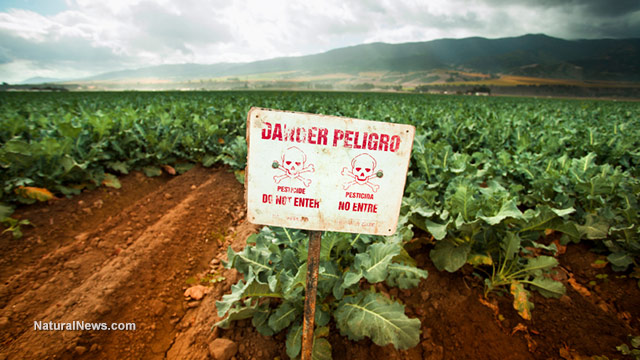Monsanto, DuPont unleash highly toxic, drift-prone dicamaba herbicide, endangering public health and North America's food supply
Wednesday, July 13, 2016 by: L.J. Devon, Staff Writer
Tags: dicamba herbicide, chemical agriculture, Monsanto

(NaturalNews) Certain kinds of plant growth are becoming more invasive in farmers' fields. These super weeds are resisting the increased use of glyphosate and other herbicides. It has been going on for awhile now. Nature is fighting back. Weeds are finding new ways to adapt and survive.
Take for instance, the garlic mustard plant (Alliaria petiolata), which has become increasingly invasive in the Midwest in recent years. It is now recommended that farmers fight back this plant with cold weather application of glyphosate. This strategy also kills many great herbs, such as shepherd's-purse and common chickweed, to name a few.
As ecological diversity of plant life disappears and as super weeds take hold in the fields, biotech corporations have only one solution...
Abusive cycle continues with wide scale release of toxic dicamba herbicide
Corporations, like Monsanto and DuPont, believe the solution to the problems they create is to continue the abusive cycle of creating stronger herbicides - which only endanger public health, strip the soil of its minerals and nutrients, and kill off beneficial, native plant life.How else would these biotech corporations continue to protect their monopoly on genetically modified seeds? How else would they continue to control farmers, agriculture, and the food supply?
Even though these corporations continue to destroy the environment and public health, regulators at the USDA continue to give Big Biotech the green light for unleashing new waves of highly toxic herbicides.
Like partners in crime, Monsanto, DuPont, and the USDA are coming together to unleash the highly toxic, drift prone dicamba herbicide for Monsanto's new line of GM dicamba-tolerant soybean and cotton seeds.
Monsanto always has another "answer" for the problems they create. The USDA even admits that these new dicamba-tolerant seeds are "not likely to provide for agronomic sustainability" but they approved their commercial release anyway.
The USDA predicts that there will be an 88-fold increase in dicamaba spraying in the next year. To prepare for wide scale dicamaba sales, Monsanto has already asked the Environment Protection Agency to increase tolerance levels for dicamaba by 150-fold for use on cotton seed.
Dicamba is very drift prone, threatening organic farming and all broad leaf plants
Virtually all broadleaf plants, including fruits, nuts, vegetables, and non-GM commodity crops face certain eradication in the presence of dicamba. Not only does this herbicide drift after it is sprayed, but it also evaporates in the days and weeks after application, drifting for miles before destroying another person's crops and plants. Dicamba is designed to disrupt the normal growth processes of plants through hormonal pathways.Unleashing the new herbicide will have irreversible effects on native flora and fauna and will continue the chemical assault on human health. To make matters worse, dicamba has a bad reputation for drifting to neighboring fields and committing genetic damage to organic, non-GM crops. Organic farmers suffer crop losses because of herbicide drift. Herbicides like dicamba inadvertently yet predictably assault the property of organic farmers, hurting their yields and making it harder for them to keep their food free of toxins. Furthermore, organic farmers have no recourse in the courts because herbicide-doused, GM seeds are a protected, patented property. In fact, Monsanto has a sordid history of actually suing organic farmers, claiming that their GM technology is stolen when their GM seeds mate with plants from neighboring organic farms.
On top of all this, organic farms have to go through strict, expensive testing and validation to prove that their crops are indeed clean and free from biotech toxins. Shouldn't it be the other way around? Shouldn't toxic GM food be placed under heavy scrutiny, labeled with warning stickers, and strictly sanctioned off so it won't pollute real whole foods?
If herbicides and GM traits drift to organic fields, organic farmers should be able to sue Monsanto, not the other way around. Thankfully there are ways to grow clean food and protect it right at home, year round. These clean growing methods can and should be implemented on a large scale, but since the North American agricultural system is rigged and owned by the biotech industry, individuals will have to take matters into their own hands. Learning to grow your own food is a great way to make positive change happen, right at home.
Sources include:
AGWeb.com
GMWatch.org
Dicamba herbicide at FETCH.news
Get independent news alerts on natural cures, food lab tests, cannabis medicine, science, robotics, drones, privacy and more.
Take Action: Support Natural News by linking to this article from your website
Permalink to this article:
Embed article link: (copy HTML code below):
Reprinting this article:
Non-commercial use OK, cite NaturalNews.com with clickable link.
Follow Natural News on Facebook, Twitter, Google Plus, and Pinterest
- Newly released JFK files reveal Pentagon's role in creating Lyme disease and covid in the same lab
- Analysis: The coming economic collapse, a mass uprising and Trump's three secret weapons to halt the growing revolt
- BIGGEST SCAM: You pay income tax, then taxes on purchases, then personal property tax on what you own that you already paid taxes on with taxed money
- American food is the MOST TOXIC “FOOD” on earth
- EXPOSED: Antifa and IRS collude to shield radical funding from taxation
- The flu vaccine paradox: Are we making things worse?
- A lack of integrity in Academia: Harvard professor found GUILTY of fraudulent research to promote CRT theory
- Beyond consequence
- Heads up! List of food shortages expected in 2025 as the campaign of forced starvation continues to be waged against the American people
- Trump reverses course on Gaza plan, says “nobody is expelling Palestinians”
- Big Pharma's $8 Billion bribery scheme exposed: how doctors are pushed to prescribe junk science, not heal
- Reclaim your health: How midlife exercise reverses years of inactivity
- Mike Adams Sermon 66: God will DESTROY ISRAEL for its wickedness
- Elon Musk: Aliens could be here on Earth RIGHT NOW
- OpenAI whistleblower who dissented against how the company trained ChatGPT found dead
- Survival 101: Effective EMF blocking techniques
- Florida takes a stand: DeSantis proposes permanent ban on mRNA vaccine mandates
- Dr. Mike Yeadon releases 15-minute testimony - WATCH - about genocidal intent of COVID “vaccines”
- Reclaim your health: How midlife exercise reverses years of inactivity
- A lack of integrity in Academia: Harvard professor found GUILTY of fraudulent research to promote CRT theory
- Space war brewing? Russia threatens to destroy Starlink satellites
- EPA advisor admits the agency is funneling billions to climate groups ahead of Trump’s return to White House
- Elon Musk: Aliens could be here on Earth RIGHT NOW
- Big Pharma's $8 Billion bribery scheme exposed: how doctors are pushed to prescribe junk science, not heal
- Historian warns Israel may be entering an “IRREMEDIABLE DECLINE”
- Trump reverses course on Gaza plan, says “nobody is expelling Palestinians”
- Mike Adams Sermon 66: God will DESTROY ISRAEL for its wickedness
- Rep. Nancy Mace introduces bill to ban biological males from female facilities on federal property
- New York politicians push bill allowing governor to indefinitely detain the unvaccinated on a whim
- RFK Jr.'s SSRI antidepressant investigation sparks liberal meltdown, exposes Big Pharma's dangerous game
- 5 Simple steps to boost your brainpower: How to strengthen executive function in a distracted world
- Mark Zuckerberg's REAL NAME is Jacob Greenberg and he is the GRANDSON of DAVID ROCKEFELLER, hence the POWER of FAKEBOOK
- Survival 101: Effective EMF blocking techniques
- Sales of survival bunkers rise following Russia’s use of the Oreshnik hypersonic ballistic missile
- Trump Administration cuts 2,000 USAID jobs, places most employees on leave in sweeping reform effort
- Pilots report mysterious lights 'moving at extreme speeds' across Oregon skies
- EPA advisor admits the agency is funneling billions to climate groups ahead of Trump’s return to White House
- The Health Ranger releases “Vaccine Zombie” song and music video, using AI-animated zombies for the music video
- The pandemic as a tool for INDOCTRINATION: Understanding “The Indoctrinated Brain” by Dr. Michael Nehls
- California's social media censorship law struck down: A victory for free speech or a threat to online safety?
- Mike Adams releases new song and music video: Nothing More Disgusting Than a Globalist
- Congratulations to the FULLY UNVACCINATED as you resisted the COVID-19 PROPAGANDA MACHINE fueled by over $100 BILLION
- Mike Adams releases country western hit single: Goin’ Back in Time is Comin’ Home
- Dr. Mike Yeadon releases 15-minute testimony - WATCH - about genocidal intent of COVID “vaccines”
- RFK Jr. clears key hurdle: Sen. Susan Collins backs controversial HHS nominee, signaling a new era for health policy
- Mike Adams releases music poetry sensation: A Child of God
- Unpacking the Lies That We’ve Been Fed – new song and music video released by Mike Adams, the Health Ranger
- Trump administration takes on global censorship: A new frontier for free speech advocacy
- Ex-FBI Chief EXPOSES disgraceful government coverups of Oklahoma City Bombing, Kennedy assassinations, 9/11 WTC, and "Terrorism" as plot to destroy Constitution
- Federal judge backs Trump's mass firings, clearing path for government downsizing
- Florida takes a stand: DeSantis proposes permanent ban on mRNA vaccine mandates
- Michigan sheriff announces criminal investigation into 2020 election crimes, Dominion Voting Systems
- “Why we influenced the 2020 elections”: Facebook files reveal the coordinated effort to bury the Hunter Biden laptop story
- Bush tomato: A mighty superfood that supports digestive health
- Red Cross issues warning to stop blood plasma donations from vaccinated people
- Scientists confirm: GENIUS brain function can be spontaneously unleashed in humans without any apparent cause
- EPA advisor admits the agency is funneling billions to climate groups ahead of Trump’s return to White House
- HYSSOP: What research reveals about the health benefits of this ancient holy herb
- Two containers with completed ballots fall out of truck in Florida
- Fully vaccinated about to see “tsunami” of illness and death, warns virologist
- Today I asked our AI language model “Neo” about which phytonutrients or phytochemicals can block the spike protein related to SARS-CoV-2 … Here is what it answered…
- Global leaders unite to clamp down on “misinformation” with UN-backed Cascais Declaration
- BREAKING: 2025 NDAA authorizes mandatory military draft of WOMEN across America… as Pentagon pursues global NUCLEAR war with both Russia and China at the same time
- Michael Yon warns of a ZIONIST TAKEOVER in Trump’s second administration
- BOMBSHELL: DNA testing kits are a SCAM to develop ethnic-specific bioweapons
- Ozempic and Wegovy weight loss drugs are injectable LIZARD VENOM PEPTIDES that may unleash a devastating wave of organ failure… side effects align with symptoms of SNAKE BITES
- Israeli soldiers accused of even more torture and abuse in the West Bank
- These 13 countries just signed an agreement to engineer a global FAMINE by destroying food supply
- NASA admits that climate change occurs because of changes in Earth’s solar orbit, and NOT because of SUVs and fossil fuels
- RFK Jr. clears key hurdle: Sen. Susan Collins backs controversial HHS nominee, signaling a new era for health policy
- Sermon 30: How Jesus reveals Caesar’s FAKE CURRENCY and FALSE AUTHORITY
- Coriander seeds: Ancient medicine backed by modern science
Science News & Studies
Medicine News and Information
Food News & Studies
Health News & Studies
Herbs News & Information
Pollution News & Studies
Cancer News & Studies
Climate News & Studies
Survival News & Information
Gear News & Information
News covering technology, stocks, hackers, and more



"Big Tech and mainstream media are constantly trying to silence the independent voices that dare to bring you the truth about toxic food ingredients, dangerous medications and the failed, fraudulent science of the profit-driven medical establishment.
Email is one of the best ways to make sure you stay informed, without the censorship of the tech giants (Google, Apple, Facebook, Twitter, YouTube, etc.). Stay informed and you'll even likely learn information that may help save your own life."
–The Health Ranger, Mike Adams












































